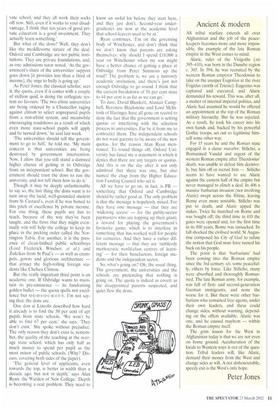Ancient & modern
AS tribal warfare extends all over Afghanistan and the job of the peacekeepers becomes more and more impossible, the example of the late Roman empire in the West comes to mind.
Alaric, ruler of the Visigoths (AD 395-410), was born in the Danube region c. 365. In 394, he was recruited by the western Roman emperor Theodosius to take on the usurper Eugenius at the river Frigidus (north of Trieste). Eugenius was captured and executed, and Alaric demanded his reward. This was, after all, a matter of internal imperial politics, and Alaric had assumed he would be offered an appointment at the top of the Roman military hierarchy. But he was rejected. As a result, he took his career into his own hands and, backed by his powerful Gothic troops, set out to legitimise himself some other way.
For 15 years he and the Roman state engaged in a danse macabre. Stilicho, a Romanised Vandal and regent of the western Roman empire after Theodosius' death, was unable to defeat him decisively, buy him off or recruit him — Stilicho seems to have wanted to use Alaric against the eastern half of the empire but never managed to clinch a deal. In 406 a massive barbarian invasion (not involving Alaric) swept across the Rhine, leaving Rome even more unstable. Stilicho was put to death, and Alaric upped the stakes. Twice he marched on Rome and was bought off; the third time in 410 the gates were opened and, for the first time in its 800 years, Rome was ransacked. Its fall shocked the civilised world. St Augustine composed his City of God to refute the notion that God must have turned his back on his people.
The point is that 'barbarians' had been coming into the Roman empire since the 3rd century AD. some peacefully, others by force. Like Stilicho, many were absorbed and thoroughly Romanised. The late Roman army, for example, was full of firstand second-generation German immigrants, and none the worse for it. But there were other barbarians who remained free agents, under their own leaders, and these could change sides, without warning, depending on the offers available. Alaric was one, and he caused mayhem — within the Roman empire itself.
The grim lesson for the West in Afghanistan today is that we are not even on home ground. Acculturation of the locals to Western ways is out of the question. Tribal leaders will, like Alaric, demand their money from the West and change sides at will. A not dishonourable, speedy exit is the West's only hope.
Peter Jones


















































































 Previous page
Previous page